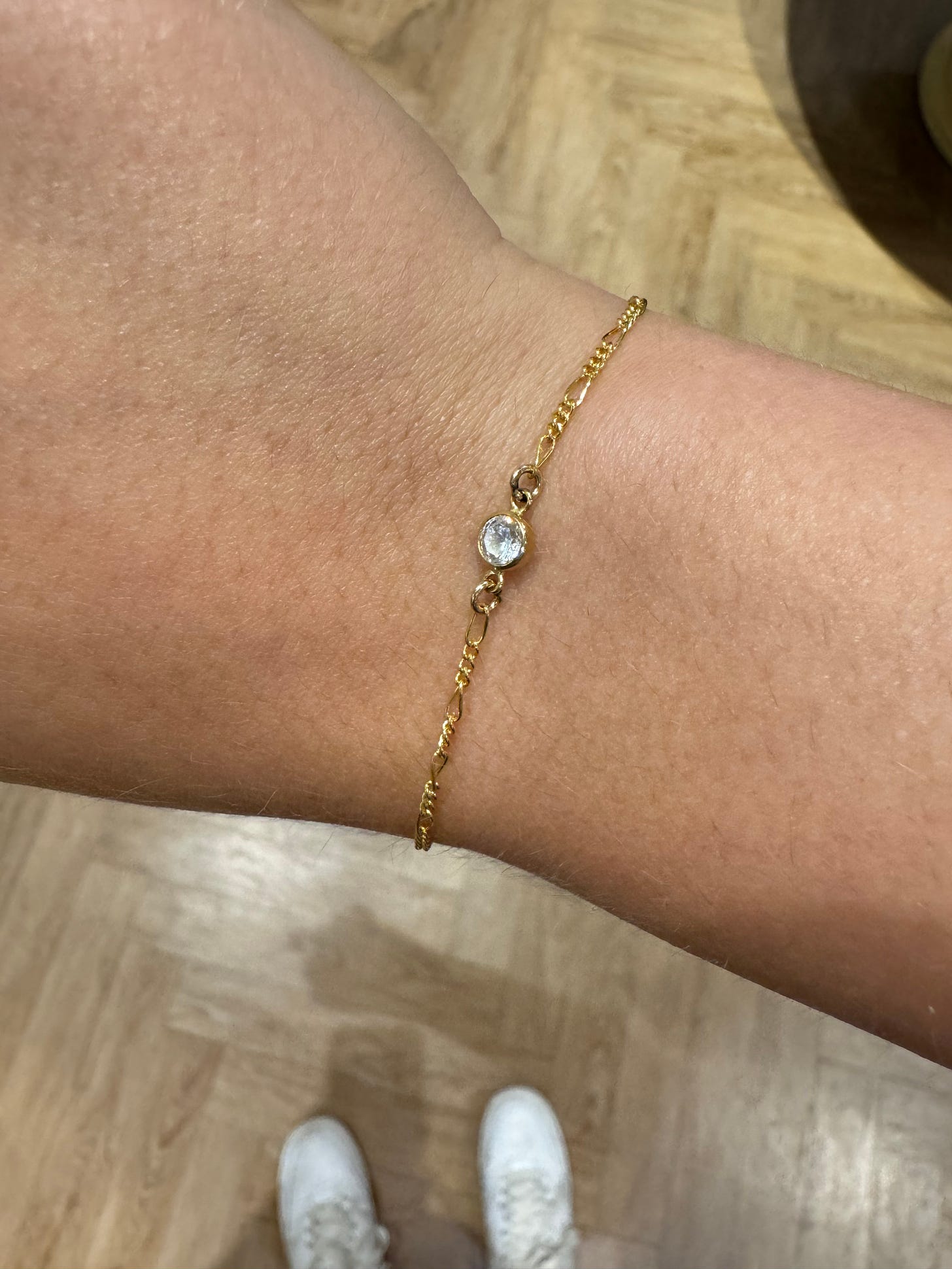Welcome to Gen Z Translator. This is What’s Up Wednesday, where I give you a personal update on a Wednesday. Clever, right? If you’re new, you can subscribe here and follow me on X. Views and experiences my own.
Earlier this summer, I decided to get a permanent bracelet.
I’d been thinking about getting one for awhile. I’ve been enjoying gold jewelry, and it felt dainty and elegant, plus it wasn’t all that expensive. The way it works is the jeweler melds the two ends together or to a charm, so you can’t take it off but there’s a little wiggle room for your skin to breathe.
The thing about jewelry, though, is that you can’t wear any for an MRI.
I guess I wanted to make a statement. “Look at me, I have permanent jewelry on because I’m cleared from medical testing and procedures for the foreseeable future.” I wanted something for me, something constant, something admirable. Unfortunately, I had to get the bracelet removed. It took the jeweler all but a second to clip it off.
It’s been a couple months since my last health update, so I wanted to take some time reflect on what this journey has been like now that I’m through the “thick” of it. It’s also October, which is breast cancer awareness month and means I’m nearing the one year anniversary of my cancer diagnosis.
I’d been feeling pretty good about my treatment over the summer, but recently I had some scan results that need to be further inspected with not-so-fun tests. I’ve also started occupational therapy and have another endoscopy on the calendar to check on my rare swallowing disorder.
It’s a hard reminder my health journey isn’t over. The scans aren’t going away. The pain, either. They say it’s a “lifelong journey” for a reason. Just because the hardest parts are over doesn’t mean there aren’t still hard parts ahead. The fact that I had cancer will never go away. There’s still a (literal) bad taste in my mouth from treatment.
There’s another edge to this sword. The things that do go away. The people, the places. Cancer is hard to talk about. Not everyone can hack it. Who someone becomes during cancer can be hard to deal with. Someone else’s reaction to your cancer journey can be hard to deal with. The whole thing is hard to deal with.
I try to downplay it, laugh it off. Oh yeah, remember that time when the techs missed my IV three times while I was under, and my whole hand turned black, blue, and yellow the days after? Haha. (I’m a cope-with-humor kinda gal).
There are times you feel invisible, and there are times you feel embarrassingly loud. For me, writing about it makes it more real and more digestible. I’m very thankful I’ve been able to have a strong, supportive community. I’ve been able to learn from people who have been where I’ve been, especially other young adults.
I’d like to pretend I wrote the following takeaways as a light, suggestive, how-to-cancer guide, but in all honesty, it was selfishly crafted. These are the things I would’ve wanted to know before starting treatment and the things I wish more people considered.
Cancer’s side effects are far and wide.
Every form of cancer is incredibly different, even within cancers. For example, I had triple-positive breast cancer, meaning I tested positive for three hormones feeding the tumor. The treatment for triple-negative breast cancer would be completely different, and that isn’t to mention the various areas the cancer can stem from. In stage 2, the growth is localized; in stage 3, it’s spread, and in stage 4, it’s metastasized. Some people get surgery before chemotherapy, some get it after. It all depends. That’s why “finding the cure for cancer” feels like such a diminutive phrase. Cancer is nuanced. There isn’t a one-size fits all solution. Some people get neuropathy — a tingling in their hands and feet — and some never do. Regardless, some side effect will stick with you from your treatment, whether that’s a sore spot or a food you will never eat again.
You’ll be surprised by who steps up — and who steps down
This one is hard to talk about – and hard to come to terms with. It’s a common adage between those who have experienced it. “People will surprise you.” You’ll make new friends you didn’t expect, and lose ones you expected to keep around forever. People will disappear from your life or crack under the pressure. There’s a reason wives are warned about their husbands leaving them if they’re diagnosed. Cancer is uncomfortable and messy. The best thing you can do in those moments is lean into your support team and others who get it, whether that’s IRL1 or in virtual communities.
Medical trauma is real
There are moments from your cancer journey you will remember forever. There are horrendous, horrendous procedures you’re required to stay awake for, since doctors don’t want to risk putting you under anesthesia if they don’t have to. Amongst conversations with my friends, I wasn’t the only one who remembered being cut into. Many of us had experienced unexpected complications during operations or upsetting conversations with doctors. Then, there’s the invalidation, frequently directed at women. I won’t generalize all doctors and nurses, but there are definitely those who didn’t believe our pain or symptoms. (Let’s not even talk about “Could you be pregnant?” and “Have you thought about losing weight?”)
People will say and do thoughtless things
No patient or survivor wants to be reduced to scars and sickness. Often, that’s what happens. Whether it’s suggesting ludicrous treatment options or insensitive comments, people manage to insult you in new and exciting ways. The biggest thing I’ve noticed is the first thing people mention when they find out you have cancer is either someone else they know with cancer or a tragedy they heard about. Sometimes it’s appropriate. Most of the times it’s not. I understand people are trying to figure out how to relate to you, but it can get exhausting. You’re allowed to talk about what’s going on in your life. Not everything has to revolve around cancer. At the same time, you can’t pretend it isn’t happening.
I’ve had a few friends compliment me on my patience, especially regarding this subject. I’d love to say its some superb trait I have but in reality, it’s exhaustion. I choose not to give any emotional energy to these interactions.
Please be a kind human being. I am begging you. Empathy is free.
An inconclusive conclusion
As with any major life change, there comes a point where you have to accept things will never be the same as they were.
You don’t always get to pick what side effects to keep and what side effects to leave, or who will stay and who will leave, but you can control your reaction to it. Everyone deals with grief differently, and cancer is nothing if not a grief-ridden experience. There’s only so much healing a body can do. You keep the scar, growing to hate it or cherish it or maybe something in between.
I keep searching for some moral to the suffering or some life lesson I can take away from the experiences of not only myself, but of every other person I’ve met going through something similar, and everyone I will never get the chance to meet. I’ll let you know when I find it.
You can read my last health update here ⤵️
What is radiation like? | Health Update #7
Since starting radiation, I’ve noticed that the concept is a tad enigmatic. I, myself, had a vision of an interrogation-type room with an orange beam set to laser me from afar while I wore sunglasses. That’s not quite what it’s like.
See the full Gen Z Dictionary here.
IRL: in real life, as opposed to online







